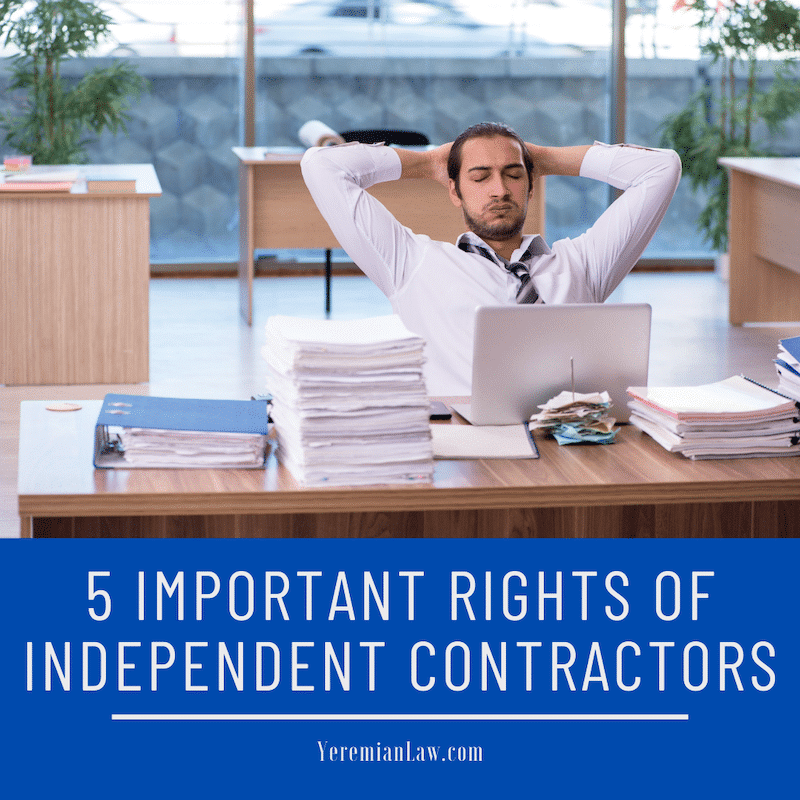If you’re an independent contractor, you have several important rights that distinguish you from a company’s employees. You also have your own responsibilities, such as paying taxes rather than having an employer withhold them from your pay. But what are your rights as a contractor, and how do they affect the way you run your business? Check out these five important rights of independent contractors and why they matter.
5 Important Rights of Independent Contractors
As an independent contractor, you have the right to:
- Control how you work
- Work when you want
- Work where you want
- Advertise your services to others
- Work with other contractors
If you’re working with an employer that challenges these rights – or who forbids you from exercising them – you may need to speak with a Los Angeles employment lawyer. Your employer may be treating you like an employee without giving you the benefits that employees are entitled to under federal and state law, and you may have legal recourse.
Related: What happens to employers that intentionally misclassify employees?
Here’s a closer look at each of your rights as an independent contractor.
Independent Contractor Right #1: The Right to Control How You Work
Your employer can ask you to complete a specific project with a specific outcome, but as an independent contractor, you choose how to get the project done. For example, your employer may tell you that you need to design a website that looks a certain way – but it’s up to you whether you hire subcontractors, work in the middle of the night or on the weekend, or work in your pajamas from your girlfriend’s sofa. It’s up to you whether you complete the project on your laptop or your desktop, or if you work on it from the computers at your local library. You decide whether you eat while you work, listen to music or watch TV, or talk on the phone – all you have to do is deliver the project, completed and on time.
Related: Your options if your employer misclassifies you
Independent Contractor Right #2: The Right to Work When You Want
Your employer can give you a deadline, provided that you agree to it, but it’s up to you when you want to work on the project. The employer can’t tell you to drop other things to work on its project, or that you must work during the day between the hours of 8 and 5. You can work on the project all day every day or just a little bit each day until it’s done. Your job is to deliver an approved project by the deadline; the employer can’t dictate when you work on it.
Related: Employee misclassification is worker exploitation
Independent Contractor Right #3: The Right to Work Where You Want
As an independent contractor, your employer can’t tell you that you have to work in a certain location. For example, if you’re a freelance blogger, your employer isn’t allowed to mandate that you come into the office and blog from its computers. You can work from a picnic table by your favorite lake, a corner café, or even your bed. (Your employer can, however, make a workspace available to you if you’d like to use it.)
Independent Contractor Right #4: The Right to Advertise Your Services to Others
As an independent contractor, you have the absolute right to advertise your services to others. That may mean setting up and maintaining your own website, running ads in online papers, or handing out business cards that tell people you’re available to work.
Independent Contractor Right #5: The Right to Work With Other Contractors
You have the freedom to hire other contractors to help you with a project that your employer hires you to complete. For example, if you’re a web developer, you have the right to hire a graphic designer and copywriter to contribute to the project. Your employer can’t tell you that you can’t do so – unless you agreed to do it all yourself in your contract.
Has Your Employer Infringed Your Rights as an Independent Contractor?
Some employers blur the lines between independent contractors and employees. Sometimes it’s accidental, and sometimes it’s intentional. If your employer is treating you like an employee by curbing your independent contractor rights, you could be entitled to the benefits that an employee is entitled to – and you may need to talk to an attorney about your situation.
Call our office at 818-230-8380 or fill out the form below to schedule your free consultation with an experienced, knowledgeable Los Angeles employment lawyer now.




